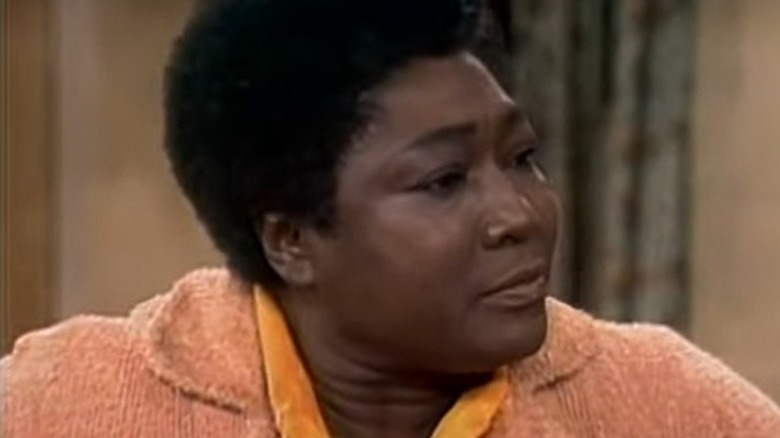Esther Rolle Age, Date Of Birth, Bio, Family And Net Worth
Esther Rolle: Age, Date of Birth & other info
Esther Rolle, a renowned actress celebrated for her powerful performances and contributions to American television, was a trailblazer who broke barriers for African American women in the entertainment industry. Throughout her illustrious career, she became known for her roles in television shows like Good Times and Maude, leaving an indelible legacy.
- Age: 78 Years
- Date of Birth: November 8, 1920
- Birth Place: Pahokee, Florida
- Weight: 140 lbs (63.5 kg)
- Height: 5 feet 7 inches (170 cm)
- Net Worth: $3 million

Early Life and Date of Birth
Esther Rolle was born on November 8, 1920, in Pahokee, Florida. She was the youngest of 18 children, born to parents, Katherine (née Lundy) and John Rolle, who were of Bahamian descent. Raised in a large family, Rolle’s childhood was shaped by the values of hard work, faith, and community, as well as the challenges of being part of a large household in a racially segregated South.Rolle attended schools in Florida before moving to New York City to pursue a career in acting. She studied at New York’s Theatre School and later honed her craft at the American Negro Theatre, where she developed her acting skills, preparing for a career that would later make her one of the most respected actresses in the industry.
Career Beginnings
Rolle’s entry into acting was not a straightforward one, as she initially worked in a variety of jobs, including as a maid and a waitress, to make ends meet. However, she always had a passion for acting and was determined to make her mark in Hollywood. In 1960, Esther Rolle appeared in her first major acting role, taking part in productions of the American Negro Theatre in Harlem.Rolle’s early television career began in the 1960s, when she appeared in a number of guest roles in various TV series. In addition to her work on TV, she also performed in theater, showcasing her versatility as an actress. It wasn’t until the early 1970s, however, that she gained widespread recognition for her work on television.
Rise to Fame: “Maude” and “Good Times”
Esther Rolle’s big break came when she was cast as Florida Evans in the groundbreaking television series Maude (1972-1974). In Maude, Rolle played the role of the housekeeper to Bea Arthur’s title character, Maude Findlay. Florida Evans, as portrayed by Rolle, was a strong, sensible, and morally upright woman. The character was a refreshing departure from the typical stereotypes of African American characters seen on television at the time.Her portrayal of Florida Evans was met with critical acclaim, and she gained national recognition for her performance. Maude was an important show in television history, as it addressed social and political issues such as women’s rights and abortion in a way that was rarely seen on network TV at the time.In 1974, Rolle was cast in a similar role as Florida Evans in the sitcom Good Times, which premiered on CBS. The series, which was set in a Chicago public housing project, followed the lives of the Evans family, focusing on Florida and her husband James (played by John Amos) as they raised their children, JJ, Thelma, and Michael.While Good Times was often light-hearted, it also tackled serious issues such as poverty, racism, and family dynamics. Rolle’s portrayal of Florida Evans resonated with viewers, as the character was the moral center of the show. Florida Evans was portrayed as a loving and strong mother, and the role became one of the most beloved in TV history.However, Rolle’s relationship with the producers of Good Times became strained after a few seasons. While the show’s popularity was undeniable, the portrayal of her character as the steady matriarch did not allow her enough opportunities for more dynamic roles. In 1976, Rolle left Good Times due to dissatisfaction with the direction of the series, especially as Florida’s character began to be sidelined in favor of focusing on the more comedic aspects of the show, particularly the antics of her son, JJ, played by Jimmie Walker.Her departure from Good Times was a major turning point in her career, but it was also a reflection of her desire to take on more substantive roles that would showcase the depth and complexity of African American characters.
Legacy and Return to “Good Times
Esther Rolle made her return to Good Times in 1978 after a brief hiatus. The show had undergone changes, with John Amos’s character also leaving the show. However, Rolle’s return was met with excitement by fans, as it brought back the familial warmth and sense of integrity that was at the heart of the show’s original success.While she was not featured in as many episodes as in the earlier seasons, her return was seen as a significant moment in the history of the series. In the final season, Rolle’s character Florida remarried and was given a more positive and uplifting storyline. Although the show ended in 1979, Rolle’s portrayal of Florida Evans continued to be remembered as one of the strongest portrayals of African American women on television at the time.Aside from her well-known television roles, Esther Rolle also appeared in numerous films and television projects throughout her career. She had a supporting role in “Driving Miss Daisy” (1989), a film that went on to become a critical and commercial success, and which addressed issues of race and class in America. Rolle’s portrayal of a wise and compassionate woman in her later years added to her rich legacy as a performer who embodied strong, multifaceted characters.Additionally, Rolle had guest roles in a variety of television shows, such as “The Love Boat,” “The Rockford Files,” and “Fantasy Island.” While her television work was well-received, she also ventured into film, continuing to earn admiration for her acting talent.
Personal Life and Family
Esther Rolle’s personal life was a mix of public and private moments. She was known to be deeply committed to her family and to her roots, never forgetting where she came from. Rolle never married and did not have children of her own, but she often described herself as being very close to her nieces and nephews, considering them her “children.”Rolle also was very protective of her family’s privacy and often kept her personal relationships out of the public eye. However, it was known that she maintained a strong connection to her Bahamian heritage and was proud of her roots. Her family was deeply important to her, and her values shaped her roles on screen.
Net Worth and Financial Legacy
At the time of her death in 1998, Esther Rolle had built an impressive career, both on television and in film. Her work as an actress, particularly her roles in Good Times and Maude, had earned her significant recognition and acclaim, making her one of the highest-paid African American actresses of her time.Estimates of her net worth at the time of her passing ranged between $3 million and $5 million. Much of this wealth came from her work in television and film, as well as her personal investments in various ventures. Rolle’s career earnings allowed her to live comfortably, but she was known for being very private and humble about her wealth. She did not live a lavish lifestyle, instead choosing to focus on her work and family.
Conclusion: Esther Rolle’s Enduring Impact
Esther Rolle’s contribution to American entertainment goes beyond her on-screen performances. As a trailblazer for African American women in Hollywood, she challenged the stereotypes and limitations placed on black actors in the 20th century. Through her roles, she portrayed strong, resilient, and multifaceted women who were unapologetically human, and she fought for more substantial roles that represented African Americans in a dignified and empowering way.Her influence continues to be felt, with many young actresses and actors citing her as an inspiration. Esther Rolle’s legacy serves as a reminder of the power of representation in the media and the importance of creating complex characters that reflect the diversity of human experience.Though Esther Rolle is no longer with us, her contributions to the entertainment industry and the cultural landscape remain an integral part of American television history. She will forever be remembered for her unforgettable performances and the roles she portrayed with such grace, wisdom, and authenticity.




